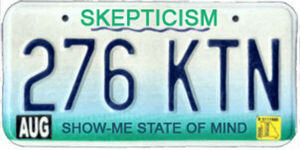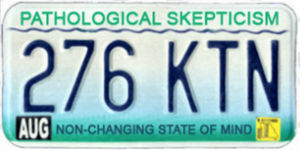When I am asked to describe myself, the term “skeptic” is often the first that comes to mind. This often, unfortunately, seems to have a negative connotation to many as, for them, skeptic and cynic are synonymous. Nothing could be further from the truth!
 For those of us who embrace the term, it’s good to be able to distinguish between scientific skepticism and pathological skepticism. Scientific skeptics (just “skeptics” for short) are those of us that demand evidence for claims and then use scientific methods to examine said evidence. We keep an open mind to new ideas, but do not accept them unquestioningly (regardless of what authority figures they come from). Michael Shermer wrote that the motto of a skeptic should be the Latin phrase Sum ergo cogito (I am, therefore I think). It is, in other words, a “show me” state of mind.
For those of us who embrace the term, it’s good to be able to distinguish between scientific skepticism and pathological skepticism. Scientific skeptics (just “skeptics” for short) are those of us that demand evidence for claims and then use scientific methods to examine said evidence. We keep an open mind to new ideas, but do not accept them unquestioningly (regardless of what authority figures they come from). Michael Shermer wrote that the motto of a skeptic should be the Latin phrase Sum ergo cogito (I am, therefore I think). It is, in other words, a “show me” state of mind.
This is easily distinguished from the pathological skeptics (just “cynics” for short), whose mindset is marked by closed-mindedness to new information. This group is highly guilty of the disconfirmation bias – only seeking disconfirming evidence for those ideas that are against their beliefs and accepting unquestioning those things that appear to support their beliefs. These folks display a “non-changing” state of mind.
One of my favorite phrases, and the guiding thought behind when I teach critical thinking and skepticism, is “Keep an open mind, but not so open that your brain falls out.” (who came up with it is a matter of some debate, as Sagan quoted Oberg as saying it, but Oberg said he had heard it from someone else, and there are variations going back over a hundred years). Too often, it seems, people either keep such an open mind that they fall for anything (cough*newagers*cough) or they are so closed off to new ideas that they refuse to believe anything outside of their small, biased worldview (cough*cynics*cough).
Balancing openness and closedness, entertaining ideas different from your own when there is evidence to support them – these are the hallmarks of a skeptic. A willingness to change your mind when confronted with new data is not a weakness, but a strength. Admitting you were wrong takes enormous amounts of courage, while just doggedly sticking to your beliefs when they have been demonstrated as false just takes enormous amounts of willful ignorance. True skeptics, just like good scientists, are willing to change their belief system based on data.
One example of this is the story of Richard Muller of the Berkeley Earth group, who was skeptical of human-induced climate change and based on his own analysis of the data, did a 180 on his views. This contrasts with non-scientists like Senator James Inhofe (Republican from my home state of Oklahoma), who despite all the evidence continue to ignore, downplay, or outright deny that climate change is occurring and anthropogenic in nature.
We, as a nation, are not skeptics. Many of us are, though, cynics. I have found all too frequently that skepticism and non-theism do not go hand in hand. Too many of us, regardless of religious belief or non-belief, fall prey to the confirmation bias and all the other reasons you can’t trust your brain. We don’t understand the difference between science and pseudoscience. We horribly misunderstand probability and statistics. Humans, as a species, do not seem to have evolved to be critical, rational thinkers. Believing comes naturally to us, disbelief does not.
In other words, we have to work hard to be skeptics and not cynics. It takes effort above and beyond what you would normally do in everyday life. Are you up to the task, or will you take the easy road to cynicism?


